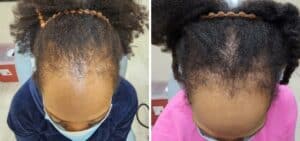Hair loss affects people of all ethnic groups. African Americans, however, can be predisposed to certain types of hair loss. In African Americans, hair loss can occur due to various reasons, including the unique characteristics of kinky hair, certain hairstyles, and underlying medical conditions. In this post, we’ll discuss the most common causes of hair loss in African Americans and the best ways to treat them.

Kinky Hair and Hair Loss in African Americans
African Americans have a variety of hair textures. They more commonly have the more unique hair texture of kinky hair. Kinky hair, also known as coily or curly hair, has a distinct spiral shape that makes it more susceptible to damage, breakage, and hair loss. The tight curls and coils of kinky hair make it difficult for natural oils from the scalp to travel along the hair shaft, leading to dryness, brittleness, and hair breakage even with combing and brushing.
Moreover, the use of harsh chemicals, such as relaxers and straightening agents, can further damage the hair. Over time, repeated chemical treatments can weaken the hair shaft and cause hair breakage, thinning, and bald spots.
To prevent hair breakage with kinky hair, it’s important to moisturize, deep condition and to avoid styling that pulls or tug at the hair too aggressively.
Read next: Kinky hair: The whys and hows of its care
Traction Alopecia and Hair Loss in African Americans
Traction alopecia is a type of hair loss that occurs due to prolonged tension on the hair follicles. Common hairstyles associated with the condition include buns, braids, hair extensions, weaves, and dreadlocks. It is more common in African Americans due to the frequent use of these hair care practices. Traction alopecia can trigger central centrifugal cicatricial alopecia or CCCA.
The constant pulling and tugging on the hair can damage the hair follicles, leading to hair breakage, thinning, and bald spots. To prevent traction alopecia, it’s essential to avoid tight hairstyles that pull on the hair, such as tight braids, weaves, and extensions. Additionally, taking regular breaks from wearing hair extensions or weaves can help reduce the risk of traction alopecia.

1 month after 1 treatment for traction alopecia
Central centrifugal cicatricial alopecia (CCCA) in Black women
Central centrifugal cicatricial alopecia (CCCA) is a type of scarring hair loss that primarily affects women of African descent. CCCA usually starts at the crown of the head and spreads outward in a centrifugal pattern. There may be itching and burning of the scalp but commonly affected people report no symptoms at all.
CCCA is associated with a history traction from tight or heavy hair styles, such as braids, weaves, extension or dreadlocks, in a susceptible person. The exact cause of CCCA is unknown, but it’s believed to be a combination of genetic, hormonal, and environmental factors. CCCA often occurs with traction alopecia, however the condition continues to cause hair loss even after the offending hair styles are discontinued.
Early diagnosis and treatment are crucial to prevent permanent hair loss and scarring. Treatment options for CCCA may include protective hair styling, topical or oral medications, steroid injections, or surgical hair restoration. Taking regular breaks from braids, wearing hair extensions or weaves can help reduce the risk.
Read: Can lupus cause hair loss?
Acne Keloidalis Nuche and black men
Acne keloidalis nuche is a chronic skin condition that primarily affects African American men. It’s characterized by the formation of hard, painful bumps on the back of the scalp and neck. These lesions can lead to scarring, keloids and hair loss. It is more common in men who shave the hair down close to the scalp in this area.
The exact cause of acne keloidalis nuche is believed to be linked to inflammation in the hair follicles that occurs from the trauma of curly and kinky hair curling back into the skin. Treatment options for acne keloidalis nuche may include wearing the hair longer, topical or oral antibiotics, steroids, or surgical excision of the affected area.

Dissecting cellulitis
Dissecting cellulitis, also known as perifolliculitis capitis abscedens et suffodiens, is a rare inflammatory condition that affects hair follicles on the scalp. It can cause tender nodules, lumps, scars, pustules and hair loss on the scalp. Dissecting cellulitis more common in black men.
While the exact cause of dissecting cellulitis is unknown, it is believed to be related to abnormalities in the hair follicle, including increased sebum production and blockage. The condition may also worsen due to bacterial superinfection. In people of African descent, the condition may be more common due to genetic factors, but more research is needed to fully understand the connection.
Dissecting cellulitis can be a chronic condition that can be difficult to treat. Early intervention and a combination of medical and surgical approaches may help to manage symptoms and prevent further hair loss. It is important for individuals who suspect they may have dissecting cellulitis to consult with a dermatologist for proper diagnosis and treatment.
Alopecia Areata
Alopecia areata is a type of autoimmune, non-scarring hair loss affecting people of all races. Recent research, however, shows an increased incidence of alopecia areata in African Americans compared to white and Asian Americans.
People with alopecia areata develop characteristic smooth patches of hair loss. The hair often grows back white. The condition appears to occur more commonly in people with darker hair. It’s cause may be due to an autoimmune reaction to hair pigment. This may also explain the increased incidence in African Americans who also have darker natura hair color.
Alopecia areata can affect hair anywhere on the body including the eyebrows, lashes, nose and beard. When it affects the whole head it is called alopecia totalis. When this condition affects the whole body, it is called alopecia universalis.
Watch: Dr. Strachan on CBS New York discussing alopecia areata – Infamous Oscar slap shine new light on alopecia
Tinea capitis (ringworm)
Tinea capitis is a fungal infection of the scalp that can cause hair loss, scaling, and itching. It is more commonly seen in children. Although it can affect people of all ethnicities, tinea capitis is more commonly diagnosed in African Americans.
Studies have suggested that African American children may be at a higher risk of developing tinea capitis due to differences in hair texture and structure, which can create an environment that is more conducive to fungal growth. Additionally, cultural hair practices such as the use of hair oils, pomades, and hair extensions may increase the risk of infection.
Diagnosis of tinea capitis requires a fungal culture. It can be treated with antifungal medications. Prompt diagnosis and treatment are essential to prevent complications such as permanent hair loss and spread.
The Crown Act
The history of racism in American has sometimes manifested as discrimination against people with kinky and curly hair. In addition to the negative emotional and economic impact, hair discrimination can be a cause of hair loss. It discourages people from wearing hair styles that are more appropriate for their texture of hair.
The CROWN Act, which stands for “Creating a Respectful and Open World for Natural Hair,” is a law that prohibits discrimination based on hairstyle or hair texture. Specifically, the CROWN Act seeks to end discrimination against people who wear their hair in natural styles. These include afros, twists, braids, locks, and other styles commonly associated with Black people.
The act aims to ensure that people are not subjected to unequal treatment, bias, or ridicule in the workplace or other settings because of their hair. The CROWN Act has been passed in several states in the United States, including California, New York, New Jersey, Virginia, Colorado, Washington, Maryland, and others, as well as in several cities and counties. It is an important step towards ending hair discrimination and promoting inclusivity and diversity.

African American Hair loss- Get Help
It’s important for black, or African American people with hair loss to get help from professionals with knowledge and experience in caring for their specific hair texture. Schedule a consultation in our Manhattan office with our hair loss expert here.


